We visited Kubaysah to look at projects and meet with local officials. Kubaysah is a sub-district of Hit. Locals complain that it is a long neglected district. Most of the people in the region are from the Kubaisi tribe, from which the town takes its name.

Above – watermelons, odd shape, good tastePower
There is universal agreement that the big bottom line problem for Kubaysah is electrical power, follow by the related impediment of fuel supply. While there is some uncertainty about precise numbers, everybody agrees that the population of Kubaysah has increased significantly since the 2003. All these new people demand electricity. Beyond that, each consumer is now pulling more power from the grid. The mayor told us that a few years ago you could count the air conditioners in the city on one hand. Today air-conditioning is becoming common and in this hot climate nothing stresses energy as much as air-conditioning. Add to this all the consumer electronics you can see for sale in local shops and the challenge is apparent. Supply will have trouble keeping up with demand even in the best case scenario and we are not dealing with the best case scenario. Electrical generating capacity has increased only a little since the Saddam era. It will take something like a heroic effort by Iraqi authorities to create the capacity to fill the burgeoning demand for electricity.
The mayor of Kubaysah sees a simpler interim solution to his town’s problem. He needs new transformers to properly take advantage of already available electricity. The town currently has a 10 MGW transformer. They need 20. The mayor thinks the provincial government already has some. All they need to do is bring a couple down and hook them up. Provincial promised to do just that, but they don’t follow through. Resources pool and get stuck in Ramadi, he says. He asked us to use our good offices to help him get what was promised. We promised to help to the extent we can. That is a big caveat.

Above – this guy claimed he couldn’t stand to be in the house when the air-conditioning went down. It didn’t look like that much of a hardship.
The energy shortage came up repeatedly in discussions at the city council as well as during our foot patrol through town. We joked that the mayor had choreographed the walk so that everybody we met would reinforce his message. In fact, this is nothing new. We hear it always and everywhere.
You perceive the obvious impact it when you see people sitting outside their houses because it is too hot to be inside w/o air-conditioning or when you buy that warm Coca-Cola at the local shop whose refrigerator doesn’t work, but those are superficial impacts. Uncertain power drives up the prices of goods and makes them less available. For example, Kubaysah is a leading producer of chickens. Commercial chicken operations are big consumers of electricity to keep large chicken houses ventilated. If it gets too hot, the chickens die. You also see an impact on fresh vegetables. Nothing grows w/o irrigation. When electric pumps stop, so does the life-giving water, which in this climate means that weeks of work can be desiccated in days or hours.
Water
Our ostensible purpose of coming to Kubaysah in the first place was to check on some of our and CA’s projects. The most prominent is a water project that will replace the old system of water pipes and bring clean drinking water to most of the city’s population.
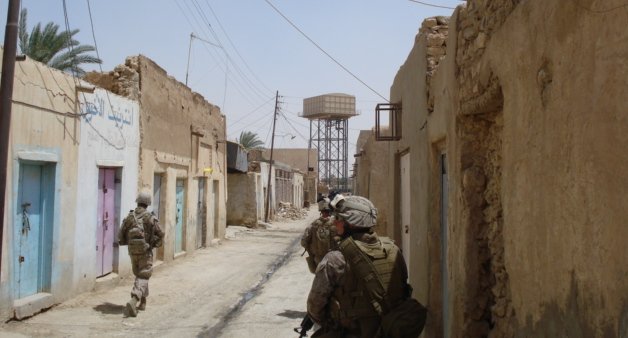
Little in terms of infrastructure or maintenance was done during the last thirty years. The water tower pictured at the end of the road is from 1963. Saddam spent money on arms and extravagant palaces. Low on the priorities list were water projects with results underground and out of sight.

The Kubaysah water system dates from the 1960s and has essentially not been maintained since. The population outgrew the system & pipes corroded, allowing sewage to seep into the drinking water. The CA funded project you see in the pictures is addressing this.

The picture shows part of the problem. That isn’t raw sewage, but it comes close. It flows until it evaporates or soaks into the ground & into corroded pipes.
A Friendly Foot Patrol
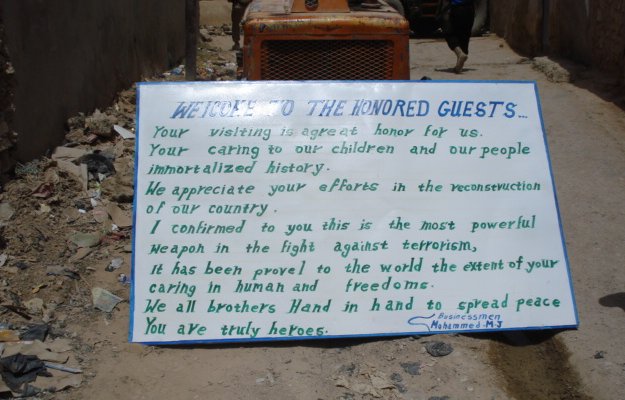
We wanted to see a place where the pipes were actually being installed. The narrow streets of the old town did not permit us to travel by MRAP, so we got out and walked. I always enjoy the foot patrols in any case and request that we do them whenever possible. I try to keep some Iraqi Dinars in my pockets and buy something at a local market. It also gives us a chance to see and be seen, as well as check the pulse of the neighborhood. I understand that this is not a scientific survey, but I also would say that I don’t trust the scientific surveys very much in Iraq.
Polling in Iraq is problematic and unusually susceptible to bias. Furthermore, I think some of those sponsoring some of the polls positively demand it.
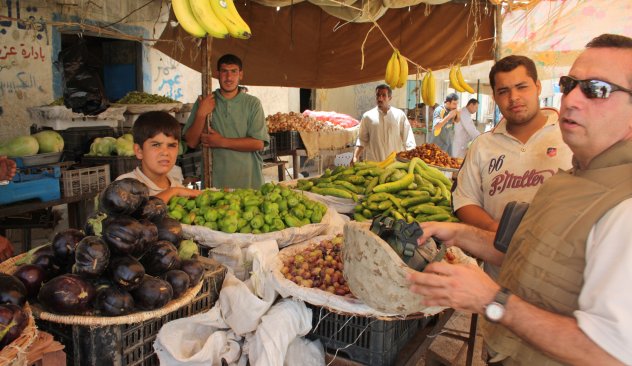
The people of the town know who their benefactor is the U.S. and the atmospherics were great. Everyone was willing to talk to us; all were smiling and friendly. When our interpreter apologized to a driver delayed by our foot patrol, he commented that is was no trouble and thanked us for what we were doing.
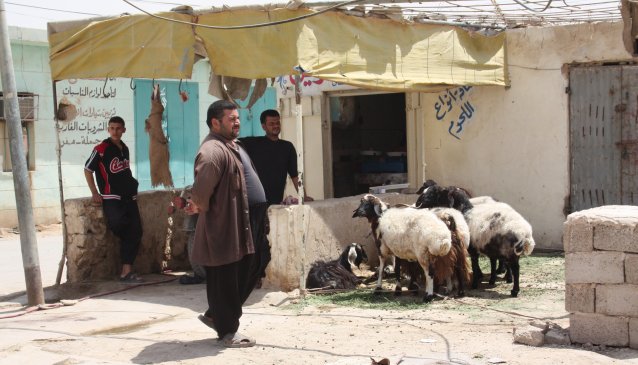
I believe he was speaking in general terms and not specifically about the water project, but the presence of hundreds of workers doing something obviously of assistance can’t hurt. The only caveat I can think of is that residents seem to have come to think of the U.S., rather than their provincial and national leadership in this role.
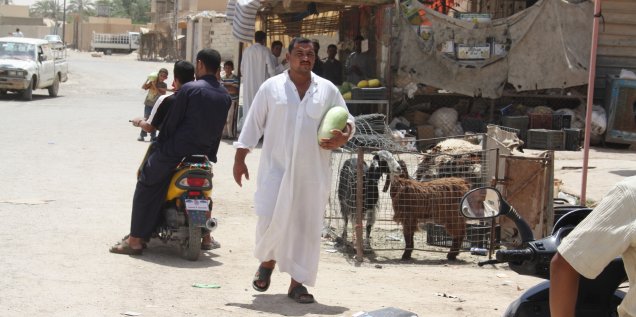
Markets were in open and the vendors claimed business was good and said that the produce, with the exception of bananas, was local. As the picture nearby shows, the butcher shop also has fresh local produce.
Eternal Vigilance
I am acutely aware that we can play our role only because the Marines with us play their so well. They are the ones who established this order that allows the flowering of peaceful commerce. I think of it in terms of Maslow’s Hierarchy: security comes before development.
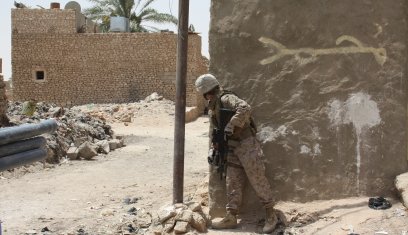
The Marines remain vigilant so our team can be secure in our work. I think I would feel safe walking around hell if the Marines were taking care of me.
Dates
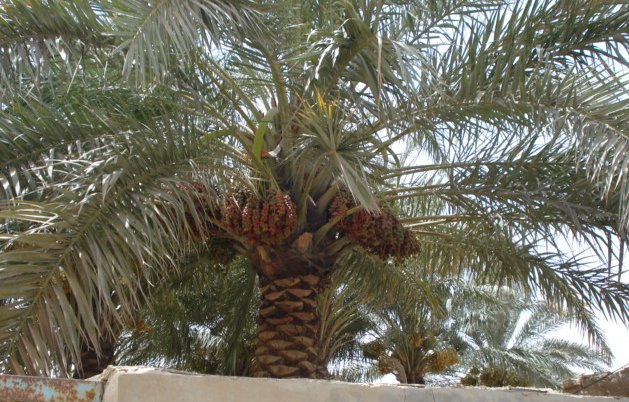
Earlier this season we noticed that few of the date palms around Al Asad had many dates and we feared that this could be a general condition. Fortunately, our local problems stemmed from lack of care. Nobody was cultivating the trees around base. Date palms can pollinate naturally, but they do so inefficiently if not cultivated and planted in the proper way. There is not shortage of dates anywhere where anyone cares enough to care enough.
Not Much Use if You Cannot Use it
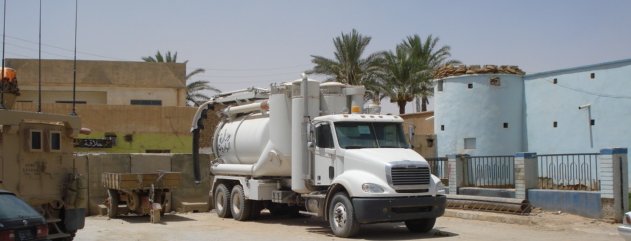
This a new sewage truck the city of Kubaysah recently received as a gift from Columbia. Everybody agrees that it will greatly enhance the city’s ability to treat its sewage – whenever anybody learns how to use it. Our ePRT is looking into getting training for the city workers.
